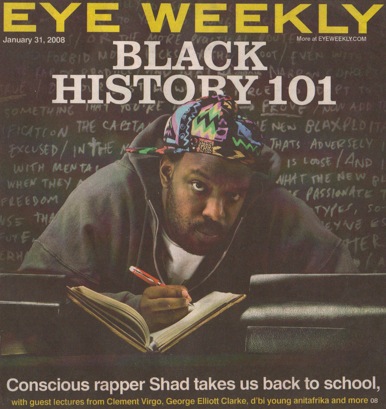Conscious rapper takes us back to school
Few records have energized Canadian hip-hop heads like Shad’s latest, The Old Prince. Born in Kenya and bred in London, Ont., Shad not only deserves respect for his intelligent, conscious rhymes and bold flow, he inspires faith among his fans, both in hip-hop and in music generally. Seamlessly blending self-parody on “The Old Prince Still Lives at Home” with an incisive examination of racial politics on “Brother (Watching),” Shad infuses his jams with hope, fun and the right amount of gravitas.
You’ve suggested that being black is a “social reality.” What did you mean?
Basically, if you try to break race down scientifically, it doesn’t really mean much. People are different shades and it doesn’t impact who they are. We all know that, right? Like whatever your skin tone is, it doesn’t affect your personality but because of the social situation, it can and it does. It’s kind of a weird thing to think that because of social parameters or stigmas, people’s perceptions can actually shape who you are.
How have your parents affected your perspective on racial issues?
Really positively; they never had expectations of me because of race. It was always, “Your responsibility is to be a certain kind of person,” and it never had anything to do with stereotypes or defying or reinforcing people’s expectations. It was that you should be a certain type of person and there shouldn’t be any barriers to that.
Really positively; they never had expectations of me because of race. It was always, “Your responsibility is to be a certain kind of person,” and it never had anything to do with stereotypes or defying or reinforcing people’s expectations. It was that you should be a certain type of person and there shouldn’t be any barriers to that.
Do you feel pressure from being a young, black man in the public eye?
Yeah, it comes to mind. If more people are looking at you, you have an ability to show them a different side of things, especially when it comes to issues of black identity in Canada now. The biggest thing is presenting a range of possibilities for people to be.
Where are we in terms of race consciousness in Canada and beyond?
If you look at North America, a lot of the systemic barriers have been broken down. You can’t overtly legislate anything racist or have racist institutions. At the same time, it takes more than 40 years to change people’s thinking. There’s still social and psychological barriers between people understanding each other.
Is Black History Month important to you?
Yeah, it is. I think I have a different experience with it, being from Africa with my parents. My understanding of my identity was maybe a little clearer than it was for people who don’t know their history because it’s been erased or downplayed.
Homework:
Reflect on your perceptions of race — your own race and the race of others. Don’t try to do anything with those perceptions yet. Just take a close look and try to understand what’s happening in your mind when you look at others and yourself.
Recommended reading:
W.E.B. DuBois, Michael Eric Dyson.
Recommended listening:
James Brown, Public Enemy, Tupac Shakur.

My Blog
Thursday, January 31, 2008

